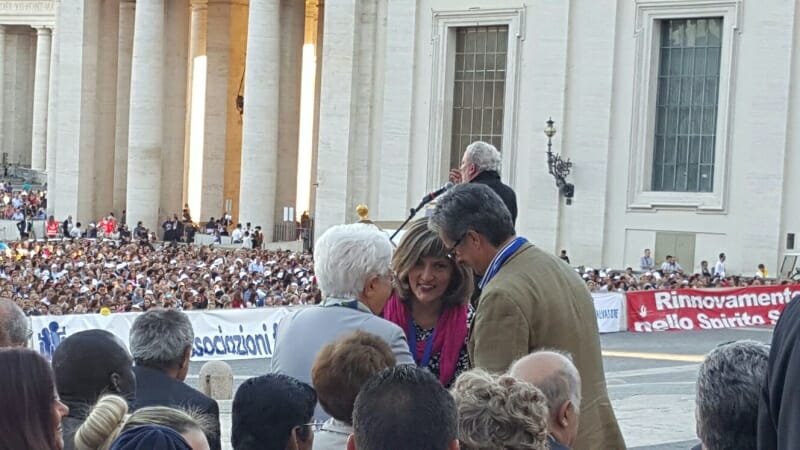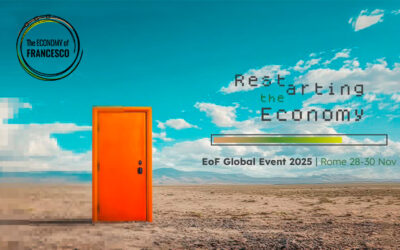 Maria Voce took part in the prayer vigil in St. Peter’s Square on Saturday, October 3rd where she gave a short talk. The journalist began by asking her: Why is this time of prayer so important? “It is because, as Christians, we believe it is above all the Holy Spirit who should be at work. This is a very delicate time when we hear many different opinions in the media. But it is only the Holy Spirit who can satisfy the great expectations, and do so as He wants and not how people think. So the most important thing is to pray for special help from the Holy Spirit, first of all for the Pope and then for all the Synod Fathers.” It helps us broaden our horizons a bit… “The family is the most wounded part of humanity at the moment. In a certain sense, it is like a sick daughter who the Church is watching over with a mother’s love, wanting her to get well. The Church is doing this act of pastoral conversion to care to one of its members who is suffering. I think all of us should have this attitude. I think we should disregard expectations for some kind of major changes from the doctrinal point of view or in the laws that govern the institution of marriage. I think that the greatest expectation is to ask ourselves as a Church what conversion is required of us towards these suffering brothers and sisters. The family is bombarded from all sides nowadays, by politics and by business lobbies; by those who want to take advantage of family issues as opportunities to pursue their own interests. The Focolare Movement has always had special concern for the family. One of its branches is especially dedicated to them and seeks to follow all the families in the world. They help prepare young people for marriage so that they can face married life with greater awareness. As far as possible they also help them find what they need (work, home, and so on) so as to start a family. And after marriage, they accompany these young couples on their new journey so that at the first signs of possible crises, which are natural, they may find a community ready to welcome and make them feel that they are not alone, that the love of the community is always present and caring. They do courses on addressing crises, with trained specialists. They help people who are separated and also those who are divorced and remarried, so that they feel, even in these circumstances, that they are members of the community and are loved and respected in their dignity as God’s children. They are helped to discover that being part of the community does not only mean sharing in the Eucharist but is manifested in living Gospel love together, sharing joys and sufferings, experiencing the closeness of God and the Church. The Synod asks all of us to make this conversion together, and this seems to me to be very important. However, I do not think that we should only focus on the divorced and remarried. The Synod is concerned with the family in its whole lifespan: widows, parents with young people who cannot find work, refugees, children, and so on. We need to look at the family as an icon of today’s society: it is humanity today that is suffering in the family. And humanity today must take on this suffering family and make this burden its own.” So the family is an encounter with the Church “going outwards” as Pope Francis continually urges us? “Absolutely! I believe it is the family that you can bear witness to the possibility of deep personal relationships, not only those you have by phone or on the internet. It is person to person relationships, with your children’s friends, and their parents, for example. Our role as laypeople is to be alongside everyone, to leave our own safe backyard so as to journey with them every day, in schools, at work, in the daily problems. This is why laity are at the Synod, and we too are very glad that a Focolare couple from Colombia were invited as auditors, Angelica Maria and José Luis from Colombia.” Last year, there was a couple from Rwanda, am I right? “Yes. I think that these married lay people at the Synod bring all the challenges that they too live and encounter, together with the others. Naturally, the Synod Fathers come with all the experiences, statements and sufferings that they have collected around the world. But this encounter between the ministerial Church and the laity is good. The Church is just one reality in which lay people and priests are together. The Church is the people of God on the move, taking care of all her children.” Listen to the complete interview of Radio Inblu with Maria Voce, 3 October 2015 (in Italian from 11’ 15’’)
Maria Voce took part in the prayer vigil in St. Peter’s Square on Saturday, October 3rd where she gave a short talk. The journalist began by asking her: Why is this time of prayer so important? “It is because, as Christians, we believe it is above all the Holy Spirit who should be at work. This is a very delicate time when we hear many different opinions in the media. But it is only the Holy Spirit who can satisfy the great expectations, and do so as He wants and not how people think. So the most important thing is to pray for special help from the Holy Spirit, first of all for the Pope and then for all the Synod Fathers.” It helps us broaden our horizons a bit… “The family is the most wounded part of humanity at the moment. In a certain sense, it is like a sick daughter who the Church is watching over with a mother’s love, wanting her to get well. The Church is doing this act of pastoral conversion to care to one of its members who is suffering. I think all of us should have this attitude. I think we should disregard expectations for some kind of major changes from the doctrinal point of view or in the laws that govern the institution of marriage. I think that the greatest expectation is to ask ourselves as a Church what conversion is required of us towards these suffering brothers and sisters. The family is bombarded from all sides nowadays, by politics and by business lobbies; by those who want to take advantage of family issues as opportunities to pursue their own interests. The Focolare Movement has always had special concern for the family. One of its branches is especially dedicated to them and seeks to follow all the families in the world. They help prepare young people for marriage so that they can face married life with greater awareness. As far as possible they also help them find what they need (work, home, and so on) so as to start a family. And after marriage, they accompany these young couples on their new journey so that at the first signs of possible crises, which are natural, they may find a community ready to welcome and make them feel that they are not alone, that the love of the community is always present and caring. They do courses on addressing crises, with trained specialists. They help people who are separated and also those who are divorced and remarried, so that they feel, even in these circumstances, that they are members of the community and are loved and respected in their dignity as God’s children. They are helped to discover that being part of the community does not only mean sharing in the Eucharist but is manifested in living Gospel love together, sharing joys and sufferings, experiencing the closeness of God and the Church. The Synod asks all of us to make this conversion together, and this seems to me to be very important. However, I do not think that we should only focus on the divorced and remarried. The Synod is concerned with the family in its whole lifespan: widows, parents with young people who cannot find work, refugees, children, and so on. We need to look at the family as an icon of today’s society: it is humanity today that is suffering in the family. And humanity today must take on this suffering family and make this burden its own.” So the family is an encounter with the Church “going outwards” as Pope Francis continually urges us? “Absolutely! I believe it is the family that you can bear witness to the possibility of deep personal relationships, not only those you have by phone or on the internet. It is person to person relationships, with your children’s friends, and their parents, for example. Our role as laypeople is to be alongside everyone, to leave our own safe backyard so as to journey with them every day, in schools, at work, in the daily problems. This is why laity are at the Synod, and we too are very glad that a Focolare couple from Colombia were invited as auditors, Angelica Maria and José Luis from Colombia.” Last year, there was a couple from Rwanda, am I right? “Yes. I think that these married lay people at the Synod bring all the challenges that they too live and encounter, together with the others. Naturally, the Synod Fathers come with all the experiences, statements and sufferings that they have collected around the world. But this encounter between the ministerial Church and the laity is good. The Church is just one reality in which lay people and priests are together. The Church is the people of God on the move, taking care of all her children.” Listen to the complete interview of Radio Inblu with Maria Voce, 3 October 2015 (in Italian from 11’ 15’’)
Yes to God
Yes to God




0 Comments